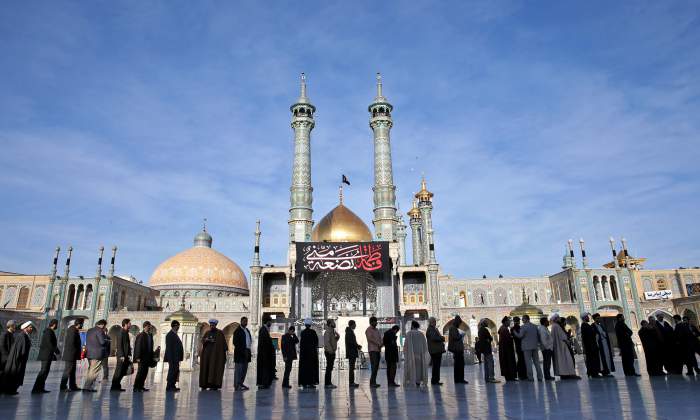Alwaght- A week of campaigning reaped its fruits yeasterday as the Iranian nation cast their polls for two crucial elections.
With 55 million Iranians eligible to vote for the 290-seat Parliament (Majlis) and the 88-member Assembly of Experts, polls opened 8 am on friday for the ballot-casting.
People’s Voice
During the campaigns, candidates addressed economic issues in the country including unemployment, economic growth, and recession to adhere to the Iranian public’s day to day concerns. Yet, Parliament’s role goes beyond everyday decisions and is even involved in making or breaking the president’s plans for the country as a new legislation must run through it first. An example is the Iranian nuclear deal.
The Iranian people’s voice usually comes in support of either the Principlists who are headed by Former Parliament Speaker Gholami Hadad Adel or the Reformists who are seeking seats under the leadership of Mohammed Reza Aref, a former vice president.
The results of this crucial vote will help the Iranian people voice their demands in Parliament.
Assembly of Experts
In the Assembly of Experts vote, Iranian President Sheikh Hassan Rouhani is vying for re-election.
The 88-member Assembly of Experts is a clerical body responsible for appointing the Supreme Leader. There are 162 opting for seats in which they would serve eight-terms if elected.
Attempts to Sabotage
Iran is the only Islamic republic in the world. Having such a place and achieving such a standard is seen as a threat to some powers in the region and likewise in the world.
A paradigm among Muslim countries, Iran is governed by an Islamic republic system. What scares the foes of Islam is the outcome that would emerge if other nations moved to follow the example of Tehran and establish an Islamic republic.
In a region where Wahabbi extremist ideologies rule in the name of Islam and suppressive monarchies attempt to distort this religion, an Islamic Republic stands for everything against these failed systems. Fear of the Islamic revolution spreading has both the West and some Arab countries on their toes. This is why these forces have spared no effort in trying to eliminate this unique paradigm.
After failing to overthrow the Islamic system in Iran by waging hard wars against it from the Nojeh coup plot, to the foreign-backed Iraq war, to the colour coups, Tehran’s adversaries have come to the conclusion that they cannot do so through these measures. A change in plan, therefore, became a must and a soft war replaced the previous one with infiltration taking the stage.
In an effort to mutate the revolution’s nature, which is Islamic in principle, the West is recruiting infiltrators to alter the direction of Iran’s decision-making process.
Highly aware of this plot, Leader of the Islamic Revolution Ayatollah Sayyed Ali Khamenei warned against attempts to infiltrate the elections, calling on the nation to remain vigilant.
“The nation neither wants a pro-government parliament nor an anti-government one,” Ayatollah Khamenei said.
"They want a courageous and devout parliament that knows its duties and is not intimidated by the United States," the Leader added.
Foreign Intervention
The intention of some foreign governments to eradicate the system in Iran is no secret. In a proposal by the Wilberforce Society, entitled: “Long Term Strategy for Facilitating a Regime Change in Iran,” Albert Beardow proposes steps for that purpose including infiltration.
Such suggestions include “a change in the figures at the head of the regime rather than a change of the system of government itself.”
The proposal claims: “There a numerous reformist figures in the government who have the knowledge and expertise to run the country, most of whom are religious and do not wish to see the Islamic Republic fall.”
In addition, it also calls for “a change through political means rather than popular uprising.”
“Due to the support the state has from large sections in society, and the divisions within Iranian society between the rural populace and those of traditional Islamic beliefs, and the westernised Middle-Class, a popular uprising would only be supported by certain groups in society, and others would oppose their aims…,” it adds.
On the media level, western propagandists are attempting to dictate to the Iranian what to do and even who to elect.
BBC Persian has recently asked Iranian people not to vote three candidates of Expediency Discernment Council of the System.
Saudi Mufti Abdul-Aziz Mohammad Al-Sheikh, meanwhile, has also urged Iranians to refrain from voting for the same three candidates: Ahmad Jannati, Mohammad-Taqi Mesbah-Yazdi, Mohammad Yazdii.
Again, the strategy is different. Instead of urging people not to vote at all, they are asking them to vote for their preferred candidates—clearly pro-western.
The agenda is out there and it is no longer a secret. It is instead clear for those who have eyes to see, ears to listen, and minds to think. Observing the West’s strategies across the world, it will become quite clear that its attempts to overthrow anti-imperialistic movements do not differ much. At the same time, many are optimistic that the voice of the Iranian nation will be heard loud and clear, despite attempts to muffle it.



























